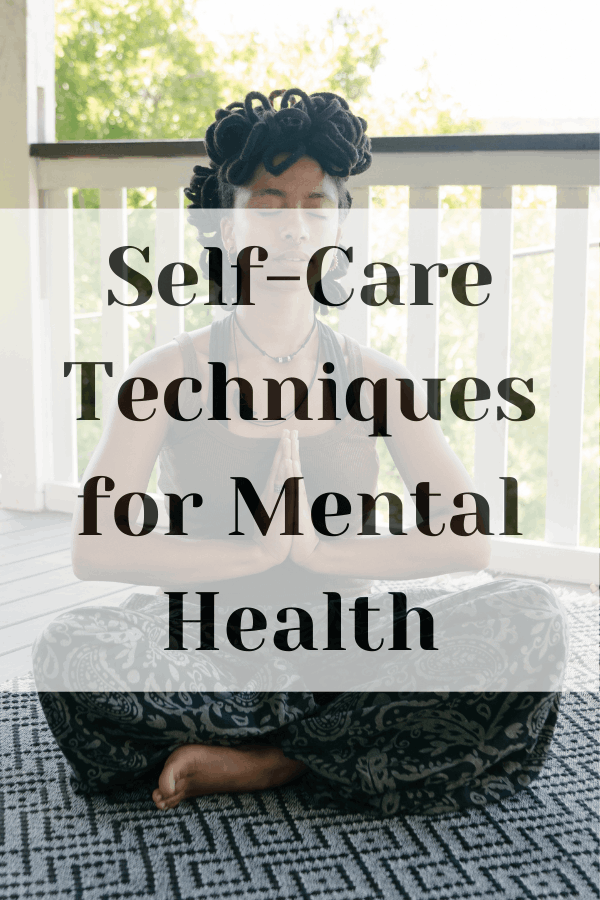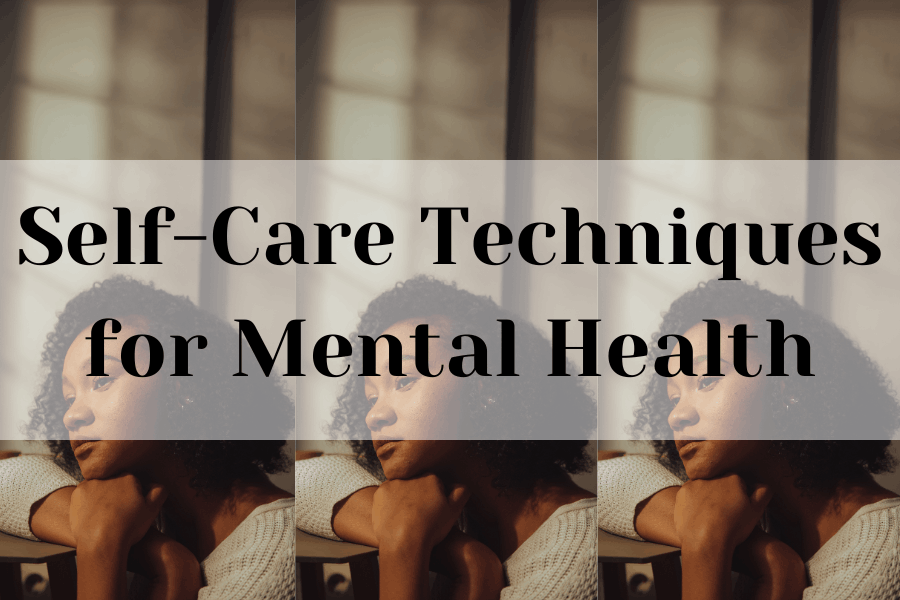Self-Care Techniques for Mental Health

Learning the importance of self-care techniques for your mental health can be a complete game changer for you.
Prioritising your mental health is not only important for you but also for those who rely on you. So, take some time for yourself and implement these simple suggestions to start to notice a difference.
This post is about self-care techniques for mental health.

What is Self-Care?
Self-care is all about taking care of yourself and your well-being. It means doing things that make you feel good and promote your physical, emotional and mental health. Self-care can look different for everyone, but it can include things like taking a relaxing bath, going for a walk, spending time with your loved ones or doing something creative. The important thing is that you’re doing something that feels good for you and helps you recharge. Think of it as taking time to fill up your cup so that you have more to give to others and to yourself.
Why is Self-Care Important for Your Mental Health?
Taking care of yourself can help you feel more relaxed, calm and in control of your life. When you prioritise self-care, you’re showing yourself that you matter and that your well-being is important. This can boost your self-esteem and confidence. Plus, engaging in self-care activities can help you manage stress, reduce anxiety and improve your mood. When you take are of yourself, you’re also better equipped to handle life’s challenges and cope with difficult situations. overall, self-care is a way to invest in yourself and your mental health, which can lead to a happier, healthier life.
Physical Self-Care
This is all about taking care of your physical health, which can have a big impact on your mental health. Physical self-care can include things like getting enough sleep, eating a healthy diet and exercising regularly. These activities can help you feel more energised, focused and confident. To implement physical self-care into your everyday life, you might start by making small changes like going to bed and waking up at the same time every day, drinking more water or taking short walks during your lunch break. You could also try finding an exercise routine that works for you, whether that’s going for a jog, taking a yoga class or doing some strength training. The key is to find activities that you enjoy and that fit into your lifestyle. By prioritising physical self-care, you’re investing in your overall well-being and setting yourself up for a happier, healthier life.
How to implement physical self-care into your daily routine:
- Make sleep a priority by aiming for 7-9 hours per night and establishing a consistent sleep schedule.
- Stay hydrated by drinking water throughout the day and limiting caffeine and sugary drinks.
- Eat a balanced diet that includes plenty of fruits, vegetables, whole grains and lean proteins.
- Find an exercise routine that you enjoy and that fits your schedule, whether it’s going for a run, taking a yoga class or lifting weights.
- Take breaks throughout the day to stretch, move around and give your eyes a break from screens.
- Practice good posture and ergonomics to avoid strain and injury.
- Get outside and spend time in nature, whether it’s going for a walk, hike or bike ride.
- Listen to your body and rest when you need to, whether that means taking a nap or just sitting quietly for a few minutes.
- Make physical self-care a non-negotiable part of your routine and prioritise it just as you would other important tasks and commitments.
Remember, physical self-care is all about taking care of your body and prioritising your health. By making small changes and finding activities that you enjoy, you can improve your physical and mental well-being and lead a happier, healthier life.
Emotional Self-Care
Emotional self-care is all about taking care of your emotional well-being. It means recognising and honouring your feelings, needs and boundaries. Emotional self-care can include things like practising mindfulness, journaling, seeking therapy and spending time with supportive friends and family. These activities can help you process your emotions, build resilience and strengthen your relationships. To implement emotional self-care into your life, you might start by setting aside time each day to check in with yourself and reflect on your feelings.
The important thing is to prioritise your emotional health and give yourself permission to feel your feelings without judgement. By practising emotional self-care, you can build a stronger sense of self-awareness and cultivate more meaningful connections with yourself and others.
Tips for implementing emotional self-care activities into your life:
- Practice mindfulness: Set aside a few minutes each day to sit quietly and focus on your breath. You can also try a guided meditation or a body scan to help you stay present in the moment.
- Journal: Write down your thoughts, feelings and experiences in a notebook or a journal. This can help you process your emotions and gain insight into patterns or triggers.
- Seek therapy: Talk to a mental health professional about your concerns and challenges. Therapy can provide a safe, supportive space to explore your emotions and develop coping strategies.
- Spend time with supportive friends and family: Connect with people who make you feel seen, heard and valued. This can provide a sense of belonging and help you feel less alone.
- Identify and address negative emotions: Notice when you’re feeling anxious, sad or angry and try to identify the source of those emotions. Then, take steps to address them in a healthy way, whether that means setting boundaries, asking for help or practising self-compassion.
The benefits of emotional self-care are numerous:
- Improved self-awareness and emotional regulation
- Reduced stress and anxiety
- Increased resilience and coping skills
- Better resilience and coping skills
- Enhanced overall well-being
To identify and address negative emotions, you might try:
- Naming the emotion: Notice what you’re feeling and give it a name, whether it’s anger, sadness or fear.
- Accepting the emotion: Allow yourself to feel the emotion without judgement or criticism. Remember that it’s okay to feel what you’re feeling.
- Investigating the emotion: Try to understand why you’re feeling the way you are. What’s triggering these emotions? What can you do to address it?
- Addressing the emotion: Take steps to address the source of the emotion in a healthy way. This might mean seeking support, practising self-care, or taking action to make a change.
Remember, emotional self-care is all about prioritising your emotional well-being and building resilience.
Mental Self-Care
Mental self-care is all about taking care of your mental and emotional well-being and can be pivotal in your self-care techniques. It involves activities that promote psychological health, such as:
Setting boundaries
This means saying “no” to things that don’t serve your best interests and prioritising your own needs and values.
Taking breaks from technology
Constant exposure to screens can be stressful and overwhelming. Taking regular breaks from technology can help you feel more centred and focused.
- Establish specific times of the day when you check your phone or email and stick to them.
- Disable notifications for apps and emails that are not urgent.
- Avoid using electronic devices for at least an hour before bed to promote better sleep.
Engaging in hobbies and activities that promote creativity and personal growth
Pursuing activities that you enjoy and that challenge you can help you feel more fulfilled and accomplished.
Managing stress
Stress is a natural part of life, but excessive stress can take a toll on your mental and physical health. Finding healthy ways to manage stress, such as practising mindfulness or engaging in physical activity, can help you feel more calm and balanced.
Practising self-compassion
Being kind and understanding toward yourself can help you feel more confident and resilient in the face of challenges.
Mental self-care is an important aspect of overall well-being and there are many activities you can do to promote mental health. Here are some strategies for managing stress:
Practice deep breathing
Taking slow, deep breaths can help calm the nervous system and reduce stress.
Exercise
Physical activity releases endorphins, which can boost mood and reduce stress.
Practice time management
Prioritise your tasks and break them down into manageable chunks to reduce overwhelm.
Practice positive self-talk
Replace negative self-talk with positive affirmations to boost self-esteem and reduce stress.

Spiritual Healing
Spiritual healing is a holistic approach to healing that involves addressing the mind, body and spirit. It is based on the belief that we are more than just physical beings and that our mental, emotional and spiritual states are all interconnected.
Spiritual healing can involve a variety of practices, such as:
Energy healing
This involves the use of different techniques to balance and restore the flow of energy in the body.
Mindfulness practices
This includes meditation, yoga and other practices that focus on being present in the moment.
Connection with nature
Spending time in nature can help you feel more connected to the world around you and provide a sense of peace and tranquillity.
Spiritual guidance
Working with a spiritual guide or counsellor can help you explore your inner self and connect with a higher power.
The benefits of spiritual healing can include:
- Improved mental and emotional well-being. By addressing the mind, body and spirit, spiritual healing can help you feel more balanced and centred.
- Reduced stress and anxiety. Spiritual practices can help you feel more calm and grounded, reducing feelings of stress and anxiety.
- Greater sense of purpose and meaning. Spiritual healing can provide a sense of purpose and meaning in life, helping you feel more fulfilled and satisfied.
It’s important to note that spiritual healing is not a replacement for medical treatment, but rather a complementary approach that can help support overall well-being.
Here are some ways to incorporate spiritual self-care into your daily routine:
Meditation
Taking a few minutes each day to sit in silence and focus on your breath can help you feel more centred and grounded.
Prayer
Engaging in prayer can help you feel connected to a higher power and cultivate a sense of gratitude.
Spending time in nature
Being in nature can help you feel more connected to the world around you and provide a sense of peace.
Social Self-Care
Social self-care is all about building and maintaining healthy relationships with others. It involves making time for social connection and engaging in activities that promote positive interactions with others.
Social self-care is an important aspect of overall well-being. Here are some ways to incorporate social self-care into your daily routine:
Spend time with friends and family
Make time to connect with the important people in your life, whether it’s through phone calls, video chat or in-person visits.
Join social clubs or organisations
Look for groups or clubs that share your interests, whether it’s a book club, a hiking group or a volunteer organisation.
Engage in activities that promote social connection
Participate in group activities, such as team sports, group fitness classes or community events.
Practice effective communication
This involves actively listening to others, expressing yourself clearly and respectfully and resolving conflicts in a healthy way.
Setting boundaries
Setting boundaries with others can help you maintain healthy relationships and prioritise your own needs.
Building and maintaining healthy relationships can have numerous benefits:
Reduced feelings of loneliness and isolation
Social connections can provide a sense of belonging and help reduce feelings of loneliness and isolation.
Improved mental and emotional wellbeing
Spending time with others can help you feel more supported and connected, which can improve your overall mental and emotional well-being.
Increased sense of purpose
Building relationships with others can provide a sense of purpose and meaning in life.
To build new social connections, try:
- Volunteering for a local organisation or charity.
- Taking a class or workshop to learn a new skill or hobby.
- Joining an online community or social network based on your interests.
To nurture existing relationships, try:
- Practicing active listening when communicating with others.
- Planning regular activities or outings with friends and family.
- Expressing gratitude and appreciation for the important people in your life.
By incorporating social self-care into your daily routine, you can build strong, healthy relationships that support your overall well-being.
Overall, self-care is an ongoing process that involves developing healthy habits and prioritising your well-being. By incorporating these different types of self-care into your daily routine, you can improve your mental health and overall quality of life.
This post was about self-care techniques for mental health.
Share this post: on Twitter on Facebook



